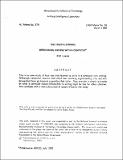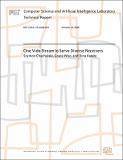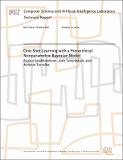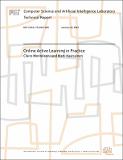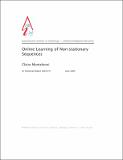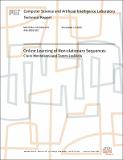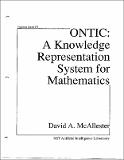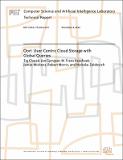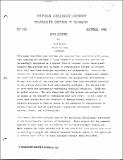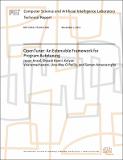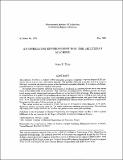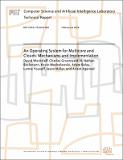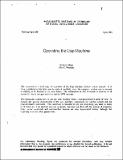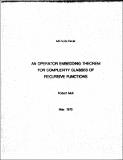Browsing Computer Science and Artificial Intelligence Lab (CSAIL) by Title
Now showing items 2368-2387 of 3804
-
One Child's Learning: Introducing Writing with a Computer
(1980-03-01)This is a case study of how one child learned to write in a computer-rich setting. Although computer access did affect her learning significantly, the details presented here go beyond supporting that claim. They provide ... -
One Clock to Rule Them All: A Primitive for Distributed Wireless Protocols at the Physical Layer
(2014-04-27)Implementing distributed wireless protocols at the physical layer today is challenging because different nodes have different clocks, each of which has slightly different frequencies. This causes the nodes to have frequency ... -
One System for Two Tasks: A Commonsense Algorithm Memory that Solves Problems and Comprehends Language
(MIT Artificial Intelligence Laboratory, 1975-11)Plan synthesis and language comprehension, or more generally, the act of discovering how one perception relates to others, are two sides of the same coin, because they both rely on a knowledge of cause and effect - algorithmic ... -
One Video Stream to Serve Diverse Receivers
(2008-10-18)The fundamental problem of wireless video multicast is to scalably serve multiple receivers which may have very different channel characteristics. Ideally, one would like to broadcast a single stream that allows each ... -
One-Shot Learning with a Hierarchical Nonparametric Bayesian Model
(2010-10-13)We develop a hierarchical Bayesian model that learns to learn categories from single training examples. The model transfers acquired knowledge from previously learned categories to a novel category, in the form of a prior ... -
Online Active Learning in Practice
(2007-01-23)We compare the practical performance of several recently proposed algorithms for active learning in the online setting. We consider two algorithms (and their combined variants) that are strongly online, in that they do ... -
Online Learning of Non-stationary Sequences
(2003-06-12)We consider an online learning scenario in which the learner can make predictions on the basis of a fixed set of experts. The performance of each expert may change over time in a manner unknown to the learner. We formulate ... -
Online Learning of Non-stationary Sequences
(2005-11-17)We consider an online learning scenario in which the learner can make predictions on the basis of a fixed set of experts. We derive upper and lower relative loss bounds for a class of universal learning algorithms involving ... -
Online Tracking of Mobile Users
(1989-08)This paper deals with the problem of maintaining a distributed directory server, that enables us to keep track of mobile users in a distributed network. The paper introduces the graph-theoretic concept of regional matching, ... -
ONTIC: A Knowledge Representation System for Mathematics
(1987-07-01)Ontic is an interactive system for developing and verifying mathematics. Ontic's verification mechanism is capable of automatically finding and applying information from a library containing hundreds of mathematical ... -
Oort: User-Centric Cloud Storage with Global Queries
(2016-12-08)In principle, the web should provide the perfect stage for user-generated content, allowing users to share their data seamlessly with other users across services and applications. In practice, the web fragments a user's ... -
Open Systems
(1982-12-01)This paper describes some problems and opportunities associated with conceptual modeling for the kind of "open systems" we foresee must and will be increasingly recognized as a central line of computer system development. ... -
OpenTuner: An Extensible Framework for Program Autotuning
(2013-11-01)Program autotuning has been shown to achieve better or more portable performance in a number of domains. However, autotuners themselves are rarely portable between projects, for a number of reasons: using a domain-informed ... -
An Operating Environment for the Jellybean Machine
(1988-05-01)The Jellybean Machine is a scalable MIMD concurrent processor consisting of special purpose RISC processors loosely coupled into a low latency network. I have developed an operating system to provide the supportive ... -
An Operating System for Multicore and Clouds: Mechanisms and Implementation
(2010-02-08)Cloud computers and multicore processors are two emerging classes of computational hardware that have the potential to provide unprecedented compute capacity to the average user. In order for the user to effectively harness ... -
Operating the Lisp Machine
(MIT Artificial Intelligence Laboratory, 1981-04)This document is a draft copy of a portion of the Lisp Machine window system manual. It is being published in this form now to make it available, since the complete window system manual is unlikely to be finished in the ... -
Operation of a Semantic Question-Answering System
(1963-11-01)A computer program has been written in the LISP programming language which accepts information and answers questions presented to it in a restricted form of natural English language. The program achieves its effects by ... -
Operational Semantics of a Data Flow Language
(1978-12)A data flow machine achieves high performance by the concurrent execution of machine code consisting of data flow graphs which explicitly represent the data dependencies among program instructions. This thesis presents the ... -
An Operator Embedding Theorem for Complexity Classes of Recursive Functions
(1973-05)Let F (t) be the set of functions computable by some machine using no more than t(x) machine steps on all but finitely many arguments x. If we order the - classes under set inclusion as t varies over the recursive functions, ... -
OPL-I An Open Ended Programming System Within CTSS
(1964-01)OPL-1, an incremental programming system presently operating with CTSS, permits the user to augment both his program and his data base during widely separated successive sessions at his terminal. Facilities are provided ...

